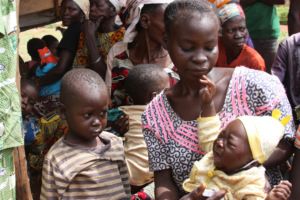News
International Round-Up: Development co-operation over traditional aid, conclude report
This article is more than 5 years old.
Public safety over a night out on the town: how the Danish PM is leading by example

The findings vindicate Denmark’s change of policy in 2015 (photo: EU Civil Protection and Humanitarian Aid Operations/Flickr)
A government-commissioned study by PEM Consult vindicates the state’s 2015 decision to change the way it gave aid to developing countries.
Instead it started to invest in development co-operation, thus encouraging sustainable growth by collaborating with the public authorities in the recipient countries.
Money well spent
Since then, it has spent just under 200 million kroner, and the study concludes that this was money really well spent.
In the past, doubts were aired whether the aid was ending up in the right pockets.
16 different countries
Additionally, the program has been able to mobilise Danish expertise that otherwise would not have been utilised.
So far, 40 different collaborations in 16 different countries have benefited.
Danish Energy Agency green-lights Nord Stream 2 pipeline operations
A lot of permission has been given in connection with the Nord Stream 2 pipeline, and it continues to flow just like the natural gas it will one day transport. The Danish Energy Agency yesterday gave the green light to the pipeline to go into operation once it has been laid over the Danish seabed in the Baltic – a construction project that it gave its blessing to earlier in the year. In total, Russian state company Gazprom will spend 64 billion kroner on laying down a pipeline that has needed approval from Finland, Sweden, Denmark, Germany and within Russia to construct.
PM to quarantine when she returns from Brussels tonight
When PM Mette Frederiksen returns from the meeting of the European Council in Brussels today, she will be tested for coronavirus in adherence with her own government’s ministerial guidelines and then go into self-isolation. Upon her release, she will make the traditional PM’s address at the reopening of Parliament on Tuesday October 6. Among the issues discussed at the two-day EC meeting were EU relations with China and Turkey.
Greater Copenhagen Committee outlines climate and green change charter
In collaboration with COWI, the Greater Copenhagen Committee, which oversees an area encompassing the Danish capital region and most of southern Sweden, has adopted a new charter with goals and frameworks for co-operation on climate and green change. The four main areas of the charter are based on the region’s areas of strength: renewable energy, energy efficiency, circular economy and climate adaptation. Among the charter’s proposals is the establishment of a science park with a focus on bio-science and a living lab for climate adaptation. Greater Copenhagen includes 85 municipalities and four regions in Scania, Halland and Eastern Denmark.
Kofod in talks with three French ministers
The foreign minister, Jeppe Kofod, visited Paris today to meet with three French ministers to discuss a wide range of issues. He spoke with his counterpart, Jean-Yves Le Drian, about the situation in Belarus, the fight against IS, the French-led military operation in Mali, and the poisoning of the Russian politician Alexei Navalny. Kofod also met the French trade minister, Frank Riester, and the European minister, Clément Beaune.










































